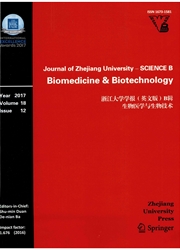

 中文摘要:
中文摘要:
目的:肌内脂肪(IMF)是衡量鸡肉品质的一个重要指标,其遗传机理是复杂的。探讨卵泡刺激素(FSH)对IMF的调控作用,有利于更好地理解鸡肉中IMF沉积的分子机制。创新点:在鸡上证明FSH可促进胸肌中IMF的沉积,且此作用与脂质合成基因表达上调有关。方法:将7日龄北京油鸡母鸡分为对照组(皮下注射生理盐水)和处理组(皮下注射4mIU鸡FSH)。连续注射7天后采集血清和组织,采用氯仿.甲醇法抽提脂肪,测定胸肌甘油三酯含量;采用鸡特异性酶联免疫吸附测定(ELISA)试剂盒检测血清FSH含量;使用实时定量聚合酶链反应(qRT—PCR)检测胸肌和腹脂组织中FAS、三儿、DGAT2、A-FABP和PPARy基因的表达水平,并对基因表达数据做主成份分析(PCA)以检测样本的重复性。结论:本实验结果显示外源FSH注射能显著提高鸡的胸肌甘油三酯含量和腹脂含量(图1);同时能显著上调胸肌和腹脂组织中FAS、LPL、DGAT2、A-FABP和P刚研基因的表达(图2)。本研究结果表明FSH可能通过调控脂类合成基因的表达来促进母鸡IMF沉积。
 英文摘要:
英文摘要:
Intramuscular fat (IMF) is a crucial factor in the quality of chicken meat. The genetic basis underlying it is complex. Follicle-stimulating hormone (FSH), well-known as an effector in reproductive tissues, was recently discovered to stimulate abdominal fat accumulation in chicken. The effect of FSH on IMF accumulation and the underlying molecular regulatory mechanisms controlling both IMF and abdominal fat deposition in vivo are largely unknown. In this study, two groups of chickens were treated with chicken FSH or a placebo. The lipid content of breast muscle, abdominal fat volume, and serum concentrations of FSH were examined. Related genes implicated in breast muscle and abdominal fat accumulation were also investigated. Compared to the control group, the triglyceride (TG) content of breast muscle and the percentage of abdominal fat in FSH-treated chickens were significantly increased by 64.9% and 56.5% (P〈0.01), respectively. The FSH content in the serum of FSH-treated chickens was 2.1 times than that of control chickens (P〈0.01). Results from quantitative real-time polymerase chain reaction (qRT-PCR) assays showed that relative expression levels of fatty acid synthase (FAS), lipoprotein lipase (LPL), diacylglycerol acyltransferase 2 (DGAT2), adipocyte fatty acid binding protein (A-FABP), and peroxisome proliferator-activated receptor ~ (PPARy) were significantly upregulated in breast muscle following FSH treatment (P〈0.01). Treatment with FSH also signifi- cantly increased relative expression levels of FAS, LPL, DGA T2, A-FABP, and PPARy in abdominal fat tissue (P〈0.05) The results of principal component analysis (PCA) for gene expression (breast muscle and abdominal fat) showed that the control and FSH treatment groups were well separated, which indicated the reliability of the data. This study demonstrates that FSH plays an important role in IMF accumulation in female chickens, which likely involves the regulation of biosynthesis genes re
 同期刊论文项目
同期刊论文项目
 同项目期刊论文
同项目期刊论文
 期刊信息
期刊信息
